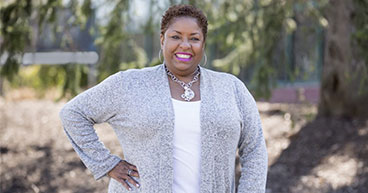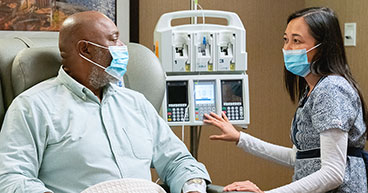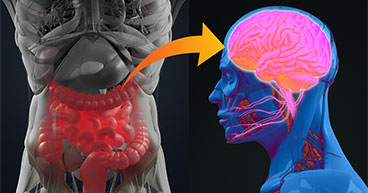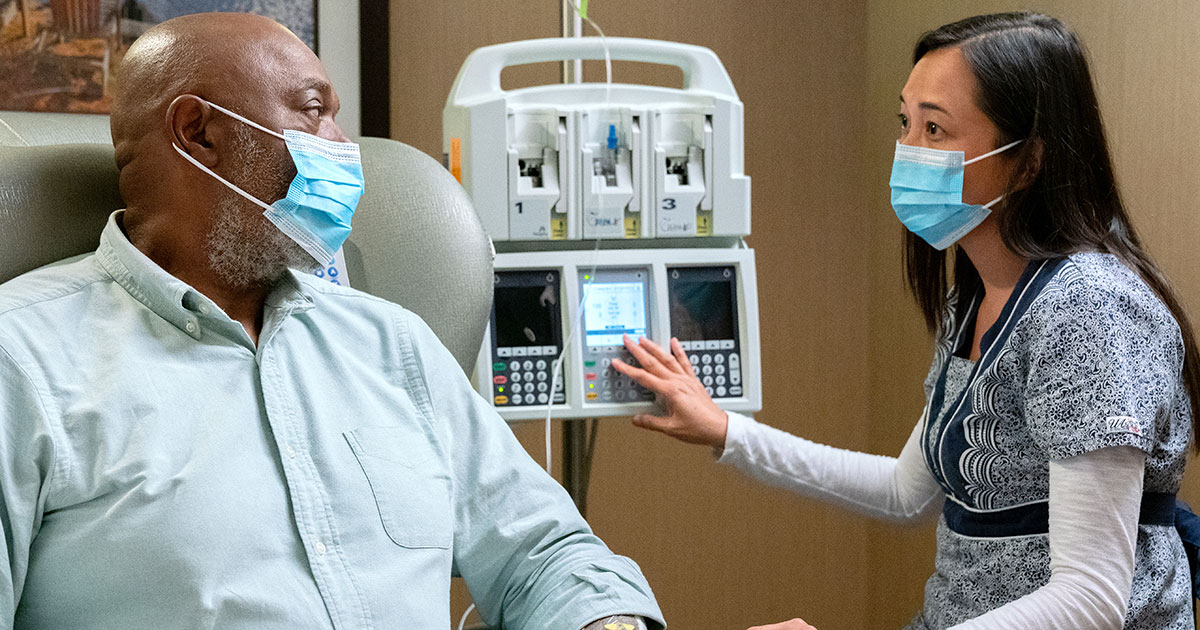
If you’re about to begin chemotherapy, it’s natural to be worried about the toll the treatment may take on you. In addition to the expected hair loss, you may also experience other difficult side effects such as fatigue, nausea, mouth sores, and diarrhea or constipation.
Chemotherapy treatments may make it more difficult for the body to fight disease, too. These drugs are designed to attack fast-growing cancer cells, but they typically also kill fast-growing healthy cells, including immune cells.
Prior to your chemotherapy, you may want to consider these three goals as you prepare to start your cancer treatment:
- Take the necessary steps to prevent interactions that would affect your treatment’s effectiveness.
- Reduce or prevent unpleasant side effects as much as possible.
- Protect your health while your immune system is compromised.
Just as important as the precautions your doctor will tell you to take while on chemotherapy treatment are the things you should avoid.
In this blog, we’ll explore eight things to avoid while on chemotherapy, including:
- Exposing yourself to infections
- Eating undercooked or raw foods
- Drinking alcohol
- Consuming acidic or spicy foods and drinks
- Overexerting yourself
- Smoking
- Exposing yourself to ultraviolet light
- Contacting or touching chemotherapy drugs or bodily fluids
If you’ve been diagnosed with cancer and are interested in a second opinion on your diagnosis and treatment plan, call us or chat online with a member of our team.
Exposing yourself to infections
Chemotherapy makes the body more susceptible to infections and less able to fight them off because it kills white blood cells that protect you from disease.
“When patients have another illness outside of that cancer that we’re treating, it can cause a delay in treatment,” says Kara Sonntag, RD, Advanced Clinical Dietitian with City of Hope Atlanta, Chicago and Phoenix. “It can make them even sicker.”
It’s important that patients on chemotherapy avoid people who have the flu, a cold, COVID-19, chicken pox or another virus or bacterial infection. Wear a mask if you find yourself in more crowded areas, to give yourself an extra layer of protection from being infected. Wash your hands frequently to kill germs you may have picked up.
Eating undercooked or raw foods
Food safety is a critical element to protecting your health and helping you avoid chemotherapy side effects, Sonntag says.
“That means making sure you’re not having raw fish, raw eggs, raw meats or anything that would be obviously moldy and making sure you’re cooking foods to proper temperatures,” she says. “That’s one thing across the board we recommend—common-sense food safety—including washing your hands before cooking and eating.”
Despite the potential health benefits of fruits, vegetables, lean meat and shellfish, you don’t want to risk getting sick from eating raw or undercooked foods. Keep sushi, raw oysters and steak tartare off your menu while on chemotherapy.
It also makes sense to favor cooked vegetables over raw ones. If you do eat raw vegetables, make sure to wash them thoroughly first, and skip lettuce and other leafy vegetables that are difficult to clean.
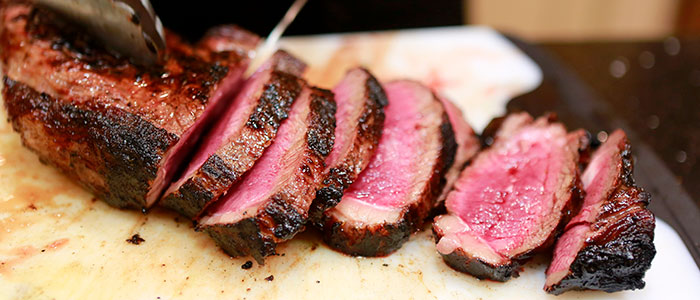
Avoid buffets, too, because foodborne illness tend to spread easily there.
Talk to your cancer care team, and don’t simply rely on what you’ve been able to eat in the past. The American Society of Clinical Oncology (ASCO) says it doesn’t make a difference if you’ve tolerated some foods well previously. There’s a chance they could harbor germs that increase your risk of infection while on chemotherapy. ASCO recommends avoiding these foods:
- Cold cuts
- Dry-cured, uncooked meats, such as salami or prosciutto
- Unpasteurized dairy products
- Soft cheeses made from unpasteurized milk, including Brie, Camembert, feta, goat cheese and queso fresco
- Smoked fish
- Deli-prepared salads with egg, ham, chicken or seafood
- Refrigerated pâté
- Unwashed fresh fruits and vegetables, especially leafy vegetables
- Unpasteurized fruit juice or cider
- Raw sprouts
- Raw or undercooked meats (especially ground beef) or poultry
- Raw or undercooked shellfish
- Sushi and sashimi, which often contain raw fish
- Undercooked eggs, such as those that are soft boiled, over easy and poached
- Raw, unpasteurized eggs or foods made with raw egg, such as homemade raw cookie dough or homemade mayonnaise
Drinking alcohol
Alcohol is a common risk factor for cancer, so health professionals recommend limiting how much you drink. There’s even more reason than just cancer prevention to avoid alcohol when receiving chemotherapy.
Both chemotherapy and alcohol consumption may stress the kidneys. Alcohol may also cause dehydration, which may worsen nausea and make it difficult to tolerate necessary chemotherapy treatments. It may also worsen other negative side effects you may be experiencing.
“When people are starting out on chemotherapy, I usually recommend that they avoid alcohol, at least for the first cycle or two of their chemotherapy, because we don’t know how they’re going to tolerate their treatment,” Sonntag says. “If they’re feeling OK on chemotherapy, I always recommend that they talk to the doctor and get the OK to have an alcoholic beverage once in a while, but that’s completely up to the doctor.”
With some types of cancer—such as breast cancer and colorectal cancers—“we just recommend avoiding alcohol in general, long term,” Sonntag says, because of their links with alcohol consumption.
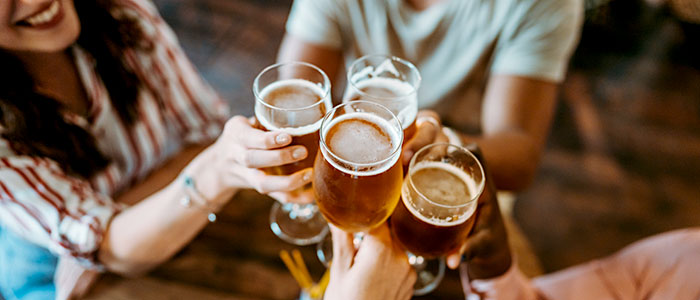
Consuming acidic or spicy foods and drinks
Spicy or acidic foods may aggravate unpleasant symptoms of chemotherapy. They may irritate mouth sores, exacerbate diarrhea and cause other digestion problems, for example.
“If patients are tolerating their treatments just fine, without any side effects, without seeing any issues in their mouths—there’s no mouth sores, there’s no reflux-like symptoms—they’re free to eat those spicy foods,” Sonntag says. “That’s something we’d look at only if somebody is having mouth sores or mucositis or any type of reflux caused by treatment.”
One food to absolutely avoid on chemotherapy: grapefruit or grapefruit juice. It can actually interfere with chemotherapy drugs.
“There is an interaction,” Sonntag says. “It can block the CYP3A4 enzymes, which are responsible for breaking down a lot of the chemotherapy medications.”
Also, drugs that aren’t metabolized may not work as designed or may remain in the bloodstream longer, build up in the blood and become toxic.
Overexerting yourself
Fatigue is a common side effect of chemotherapy. While some activity is beneficial, cancer patients need to avoid overexertion. A healthy starting point is to consider what you’ve done in the past.
“If chemotherapy patients were very active prior to diagnosis, we’d counsel them on just listening to their body, making sure they’re not causing undue stress, keeping that balance of making sure they’re keeping up their strength and energy as much as possible,” Sonntag says. “Obviously, physical activity is something we definitely promote, because it can help maintain muscle strength while going through treatment. It has to be within their abilities. For post-surgery patients, we’d ask them to get their doctor’s clearance to be able to start some sort of exercise routine.”
Smoking
As with alcohol consumption, smoking raises the risk of cancer.
“Smoking is truly one of the most avoidable things one can do to prevent cancer,” Sonntag says.
Why avoid smoking while on chemotherapy? Aside from the obvious health risks, smoking may interact with the chemotherapy treatments in a way that makes the drugs less effective, by reducing the body’s ability to absorb the cancer-fighting drugs. It may also cause hypoxia, depriving some areas of the body of needed oxygen.
Also, even though you’re undergoing treatment for cancer, it’s still possible to develop another cancer.
Surveys show that most Americans who smoke want to quit, fail several times before being able to kick the habit. Smoking cessation strategies are usually not one-size-fits-all, so it’s important to talk to your doctor or care team about developing a personalized quitting plan that works best for you. Strategies may include:
- Nicotine replacement products
- Behavioral strategies to reduce urges
- Prescription medications
- Respiratory therapy
Many online and community resources and support groups also may be available to help you quit.
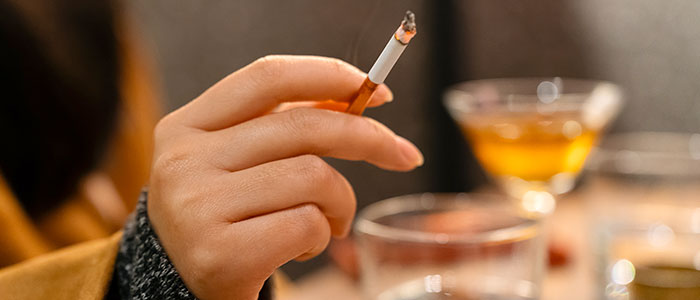
Exposing yourself to ultraviolet light
Exposure to ultraviolet light may cause you to sunburn easier, or it may worsen the dry, itchy or peeling skin sometimes caused by chemotherapy. Limit your exposure to sunlight and avoid tanning beds, because the chemotherapy may make you more sensitive to UV light—not to mention UV light’s cancer-causing radiation.
“We want our patients to get outside and live their normal lives. Sunblock can help reduce exposure,” Sonntag says. “We would recommend that they either cover up or put on sunscreen so they’re protected from any burns.”
Contacting or touching chemotherapy drugs or bodily fluids
When you’re receiving chemotherapy, it takes between 48 and 72 hours for the body to eliminate the drugs. In that time, the drugs are still in your bodily fluids, including sweat, saliva, tears, vomit, urine, semen and, if relevant, breast milk.
You should avoid contact with any of your bodily fluids during that time—and so should your caregivers or anyone who’s around you. Experts encourage patients to use a condom during sexual activity, so bodily fluids aren’t passed to their partners.
Some chemotherapy treatments may pose more of a risk than others, so check with your doctor. You may need to use gloves if you’re taking oral chemotherapy treatments and if you need to pick up items that may have gotten some of your fluids on them. Use warm water and soap if you do come in contact with any of the fluids during that time.
Chemotherapy treatments at City of Hope
Research shows that almost every patient receiving chemotherapy experiences at least one side effect. But it’s important not to let potential side effects of treatment overwhelm you.
Not every chemotherapy regimen has the same side effects. Some cancer patients may be more tolerant of the drugs and experience fewer or less-intense symptoms.
At City of Hope, nutritionists and other members of your cancer care team will help guide you through a maze of precautions you should consider. For instance, some foods that may pose a problem for some chemotherapy treatments may not be as significant an issue for other treatments.
Some chemotherapy drugs, such as oxaliplatin, tend to cause cold sensitivities. “Patients have to avoid freezer foods like ice cream or even cold foods or beverages straight from the fridge,” Sonntag says. “They have to have more room-temperature foods and beverages to help them avoid those cold sensitivities in their throats.”
Your cancer care team will make recommendations based on the known symptoms for your type of chemotherapy treatment, your past medical history, your current health and activity levels, and any other relevant health issue.
“At City of Hope, every patient gets individualized nutrition therapy for side-effect management as part of his or her treatment plan,” Sonntag says. “We try as much as possible to expand what patients are able to eat, especially if they’re having a hard time eating, just to focus on making sure that they’re eating OK.”
If you’ve been diagnosed with cancer and are interested in a second opinion on your diagnosis and treatment plan, call us or chat online with a member of our team.

